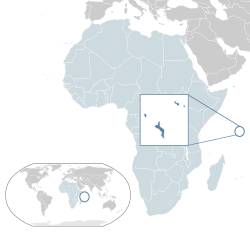Seychellois Creole
Seychellois Creole, also known as kreol, is the French-based creole language of the Seychelles. It shares official language status with English and French (in contrast to Mauritian and Réunion Creole, which lack official status in Mauritius and France).
| Seychellois Creole | |
|---|---|
| kreol, seselwa | |
| Native to | Seychelles |
Native speakers | 73,000 (1998)[1] |
French Creole
| |
| Dialects |
|
| Official status | |
Official language in | Seychelles |
| Regulated by | Lenstiti Kreol |
| Language codes | |
| ISO 639-3 | crs |
| Glottolog | sese1246[2] |
| Linguasphere | 51-AAC-cea (& -ceb) |
 Location of Seychelles where the creole is spoken | |
| Seychellois Creole test of Wikipedia at Wikimedia Incubator |
Description
Since its independence in 1976, the government of the Seychelles has sought to develop the language, with its own orthography and codified grammar, establishing Lenstiti Kreol (the Creole Institute) for this purpose.
| Language | Word | ||||||||||
|---|---|---|---|---|---|---|---|---|---|---|---|
| Creole | Nou | tou | bezwen | travay | ansanm | pou | kree | nou | lavenir | ||
| French (IPA) | /nu‿z/ | /a.vɔ̃/ | /tus/ | /bə.zwɛ̃/ | /də/ | /tʁa.va.je/ | /ɑ̃.sɑ̃bl/ | /puʁ/ | /kʁe.e/ | /nɔtʁ/ | /av.niʁ/ |
| French | Nous | avons | tous | besoin | de | travailler | ensemble | pour | créer | notre | avenir |
| Gloss | We | all | need | to | work | together | to | create | our | future | |
In several Seychellois Creole words derived from French, the French definite article (le, la and les) has become part of the word; for example, 'future' is lavenir (French l'avenir). The possessive is the same as the pronoun, so that 'our future' is nou lavenir. Similarly in the plural, les Îles Éloignées Seychelles in French ('the Outer Seychelles Islands') has become Zil Elwanyen Sesel in Creole. Note the z in Zil, as, in French, les Îles is pronounced /le.z‿il/.
Samples
- Ou, nou papa ki dan lesyel,
- Fer ou ganny rekonnet konman Bondye.
- Ki ou renny i arive.
- Ki ou lavolonte i ganny realize
- Lo later parey i ete dan lesyel
- Donn nou sak zour nou dipen ki nou bezwen.
- Pardonn nou pour bann lofans
- Ki noun fer anver ou,
- Parey nou pardonn sa ki n ofans nou.
- Pa les tantasyon domin nou,
- Me tir nou dan lemal.
49 fables of La Fontaine were adapted to the dialect around 1900 by Rodolphine Young (1860–1932) but these remained unpublished until 1983.[3]
While Seychellois laws are written in English, the working language of the National Assembly is Creole and the verbatim record of its meetings provides an extensive corpus for its contemporary use in a formal setting.[4]
(See also Koste Seselwa, the national anthem.)
Notes
- Seychellois Creole at Ethnologue (18th ed., 2015)
- Hammarström, Harald; Forkel, Robert; Haspelmath, Martin, eds. (2017). "Seselwa Creole French". Glottolog 3.0. Jena, Germany: Max Planck Institute for the Science of Human History.
- Fables de La Fontaine traduites en créole seychellois, Hamburg, 1983; there is also a selection at Potomitan.info
- National Assembly - Hansard - Verbatim
References
- D'Offay, Danielle & Lionnet, Guy, Diksyonner Kreol - Franse / Dictionnaire Créole Seychellois - Français. Helmut Buske Verlag, Hamburg. 1982. ISBN 3-87118-569-8.
External links
| For a list of words relating to Seychellois Creole, see the Seychellois Creole language category of words in Wiktionary, the free dictionary. |
- Seychellois Creole Institute
- Seychelles Creole Vocabulary List (from the World Loanword Database)
- 21st Creole festival, October 2006 (In Creole)
- Seychelles Creole Magazine (Discover the Creole Culture)
- Liv Servis online triglot text in English, French and Seychellois Creole digitized by Richard Mammana
- Universal Declaration of Human Rights in Seychellois Creole
| Seychellois Creole test of Wiktionary at Wikimedia Incubator |